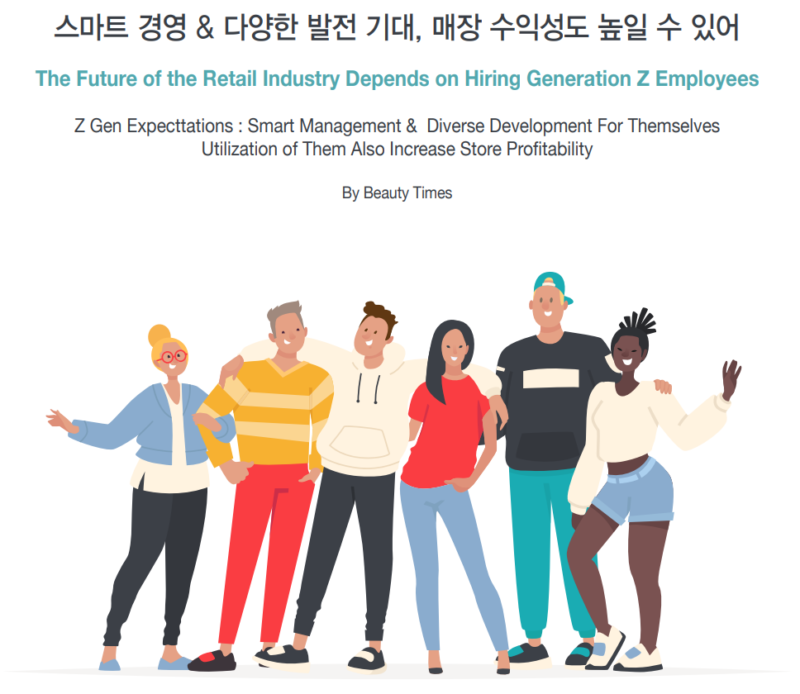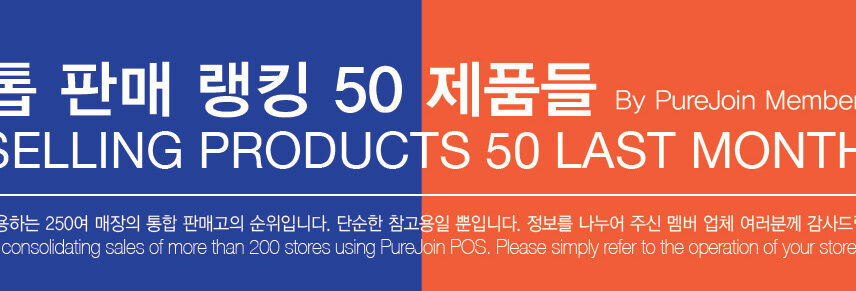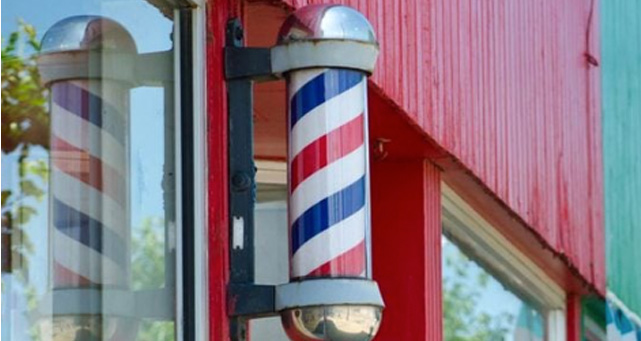
요즈음 소매점의 최전선에서 일하는 직원들은 밀레니얼 세대(1981년생-1996년생)와 Z세대(1997년생-2013년생)이 다수라고 한다. Z세대는 9.11 이후에 태어나 9.11을 겪어보지 못한 20대 중반~30대 초반 나이의 세대를 칭한다.
통계에 따르면 팬데믹 동안 미국의 소매업계는 경험 많은 직원들을 대거 잃었으며, 현재 직원들의 90%가 주로 Z세대와 밀레니얼 직원들로 구성되어 있다고 한다. 따라서 소매업계의 미래와 도전은 이들 Z세대를 어떻게 활용하는가에 달려 있다고 전문가들은 주장한다.
특히 새로운 직원들은 오랜 기간 머무를 가능성이 낮고, 실제로, 최근 통계는 85%의 소매업자들이 대부분의 직원들이 2년 이하로만 회사에 머무른다고 말한다. 검증된 전투력을 가진 직원들을 잃는 것은 매우 아쉬운 일이다. 하지만 Z세대 직원들의 유입은 소매업자들에게 비즈니스의 몇 가지 핵심 측면을 새롭게 재고할 수 있는 중요한 기회를 제공하고 있다. 소매업자들이 이들 세대를 잘만 활용하면 비즈니스를 그 어느 때보다 성공적으로 만들 수 있다는 것이다. 전문가들은 활용방안에 대해서 다음과 같이 네 가지 영역으로 분류했다:
These days, the employees working at the forefront of retail stores are mostly from the Millennial generation (born 1981-1996) and Generation Z (born 1997-2013). Generation Z refers to the generation in their mid-20s to early 30s who were born after 9/11 and did not experience it.
According to statistics, during the pandemic, the retail industry in the United States lost a significant number of experienced employees, and currently, 90% of the workforce consists mainly of Generation Z and Millennials. Therefore, experts argue that the future and challenges of the retail industry depend on how Generation Z is utilized.
In particular, new employees are less likely to stay for a long time, and recent statistics show that 85% of retailers say that most of their employees stay with the company for less than two years. Losing employees with proven capabilities is very regrettable. However, the influx of Generation Z employees is providing retailers with a critical opportunity to rethink several key aspects of their business. Experts say that if retailers utilize these generations well, they can make their business more successful than ever. The experts have categorized the utilization methods into the following four areas:
1. Z세대의 독특한 다양성을 활용하라
Z세대는 지금까지 가장 다양한 인종의 세대로서 비백인이 밀레니얼 이후 미국인의 거의 절반을 차지하고 있으며, 도시 지역에서는 거의 3분의 2에 달하고 있다. 잘 나가는 소매업자들은 이들을 이용하여 다국어 및 다문화 고객 기반을 대상으로 서비스를 제공하고 있으며, 미국 소비자들에게 놀라운 고객 경험을 제공하고 하고 있다고 한다.
Z세대 직원들도 다양성과 포용성을 경영주가 발휘해줄 것을 바라고 있으면, 이를 자기가 근무하는 회사의 최고의 가치로 생각한다. 또한 자신들의 다양한 관점을 회사내서 승진 및 전략적 의사결정에 반영되기를 바란다. 따라서 이런 Z세대의 부상은 소매업자들이 단순히 최전선의 다양성을 개선하는 일은 물론, 내부 및 고객 대면 메시징 및 프로세스를 더욱 포괄적으로 만들어 가도록 계속밀어붙이고 있다고 한다.
1. Utilize the Unique Diversity of Generation Z
Generation Z is the most racially diverse generation to date, with nonwhites comprising nearly half of the American population post-Millennials, and nearly two-thirds in urban areas. Successful retailers are utilizing them to provide services to a multilingual and multicultural customer base, offering astonishing customer experiences to American consumers.
Generation Z employees also expect their employers to demonstrate diversity and inclusivity, considering it one of the highest values of the company they work for. They also want their diverse perspectives to be reflected in promotions and strategic decision-making within the
company. Therefore, the rise of Generation Z is continually pushing retailers to not only improve diversity at the forefront but also to make their internal and customer-facing messaging and processes more inclusive.

2. 새로운 직장 기술로 운영 현대화하기
대부분의 밀레니얼 세대와 거의 모든 Z세대는 디지털 원주민으로, 손에 스마트폰을 들고 태어났다. 이들 직원들 가운데 45%는 생활의 대부분을 온라인에 의존한다. 이는 소매업자들이 직원 관리를 디지털화하고 근로자들의 손에 최고의디지탈 기기를 제공해야 한다는 것을 말한다.
상향식 및 동료 간 메시징부터 작업 관리와 프로세스 과정의 준수에 이르기까지, 디지털 도구는 생산성을 높이고 수익을 증가시킬 수 있으며, 이들 Z세대 직원들은 회사가 이를 채택하기를 열망한다. 이런 이유로 혁신적인 소매 하드웨어 및 소프트웨어를 회사가 갖추고 있느냐의 여부에 따라 직원 모집 및 유지에 커다른 영향을 미친다. 잘 설계된 앱을 사용하고 손에 스마트폰을 들고 일하는 Z세대 소매 직원들은 더 행복하고, 자신의 일에 더 만족할 가능성과 계속근무할 가능성이 높다는 것이다.
2. Modernize Operations with New Workplace Technologies
Most Millennials and almost all of Generation Z are digital natives, born with smartphones in their hands. Among these employees, 45% rely mostly on online for their daily lives. This indicates that retailers need to digitalize employee management and provide their workers with the best digital devices.
From bottom-up and peer-to-peer messaging to task management and process compliance, digital tools can increase productivity and profits, and Generation Z employees are eager for their companies
to adopt them. For this reason, whether a company is equipped with innovative retail hardware and software can significantly impact employee recruitment and retention. Generation Z retail employees
who use well-designed apps and work with smartphones in hand are likely to be happier, more satisfied with their jobs, and more likely to continue working there.

3. 직원 복지와 가치를 우선시하기
갤럽 조사에 따르면 최근 세대들은 경영주에 대해 그 어느 때보다 높은 기대를 가지고 있다고 한다. 특히 윤리성, 투명성, 직원 복지에 대한 약속, 다양성 프로그램에 따라 취업의 여부를 결정한다. Z세대 직원들을 고용하여 사업적 성공을 성취하려면, 소매업자들은 이러한 도전에 부응하고 모든 사람을 위해 더욱 공정해야 하고, 직원 친화적인 경영 구조와 프로세스를 구축해야 한다. 이런 환경의 구축은 직원들이 진정으로 믿는 브랜드 가치도 포함되며, 이런 가치에 직원들 자신이 직접 관련하여 참여할 수 있도록 해주어야 한다는 것이다.
3. Prioritize Employee Well-being and Values
According to a Gallup survey, recent generations have higher expectations than ever before from their employers. They particularly decide on employment based on ethics, transparency, commitment
to employee well-being, and diversity programs. To achieve business success by employing Generation Z employees, retailers must meet these challenges, be fairer for everyone, and establish an employee-friendly management structure and processes. Building such an environment also includes establishing brand values that employees truly believe in, and allowing employees to directly relate and participate in these values.
4. 전문성 성장을 위한 더 유연한 경로 만들기
Z세대 직원들은 단순히 교대 근무을 하면서, 급여를 받고 귀가하는 다람쥐 쳇바퀴도는 일상이 아니라, 자신들도 경영 과정에서 더 큰 무언가 일부가 되길 원한다. 그들 스스로가 정체감을 느끼지 않도록 하기 위해, 그들은 자신도 회사와 함께 어떻게 발전할 수 있는지 정확히 알고싶어 한다. 어떻게 그들이 그런걸 느끼게 할 수 있을까? 직원들이 스스로가 자신의 업무에 대한 명확한 목적의식을 갖게 하고, 그런 목적의식과 연결감을 느낄 수 있는 도구를 제공하는것으로 시작된다. 또한, 뛰어난 직원들에 대해서는 알아주고 보상할 수 있도록 관리 및 성과 모니터링 시스템을 구축하는 것이 필요하다.
보다 넓게는, 소매업자들은 자기들의 이익뿐만 아니라 조직의 장기적 건강을 위해서도 Z세대 직원들을 양성하는 것이 회사에 얼마나 큰 이점이 되는가를 고려해야 한다는 것이다. 이들 새로운 소매업체의 직원들은 특히 선반 채우기와 같은 고정된 역할에 대해서는 관심이 없다. 뭔가 지속적인 배움이 있고, 그런 배움을 통해서 자신이 더 발전되기를 갈망한다. 따라서, 고용주는 디지털 마이크로 교육 및 업스킬링 앱과 같은 도구를 활용하여 그들의 성장을 지원하고 참여도를 높이며 소매 분야에서 이들 직원들의 경력 발전 가능성을 심어주어야 한다는 것이다. 결국 소매업계 자체가 인재풀을 양성하는 일이라는 것이다.
특히 우리 B/S업계의 경우 더욱 이 부분에 집중해야할 것으로 사료된다. 그동안 전문 인력보다는 전문성과 관계 없이 이민자 한인들을 주로 채용했던 옛날식 매장운영은 더 이상 가능하지 않게 되었다. 이민자들이 많지 않은 것도그 이유 가운데 하나다. 따라서 미국내 다양한 인종의 Z세대들을 확보하여 인재의 풀을 키우는 일이 매우 중요해졌고, B/S업계의 미래가 또한 여기에 달려 있다고 하겠다.
4. Create More Flexible Paths for Professional Growth
Generation Z employees don’t just want to be part of a routine where they work shifts, get paid, and go home; they want to be a part of something bigger in the business process. To avoid feeling stagnant, they want to clearly understand how they can develop along with the company. How can this feeling be fostered? It starts with providing employees with a clear sense of purpose in their work and the tools to feel connected to that sense of purpose. Additionally, it’s necessary to establish management and performance monitoring systems that recognize and reward outstanding employees.
More broadly, retailers need to consider how nurturing Generation Z employees is beneficial not only for their immediate profits but also for the long-term health of the organization. These new retail employees, in particular, are not interested in fixed roles such as stocking shelves. They desire continual learning and through that, personal development. Therefore, employers should use tools like digital microlearning and upskilling apps to support their growth, increase engagement, and plant the possibility of career advancement in retail. Ultimately, it’s about cultivating a talent pool within the retail industry itself.
Especially in our B/S industry, it’s necessary to focus more on this aspect. The old way of store operations, which primarily hired Korean immigrants regardless of their expertise, is no longer feasible. One reason is the reduced number of immigrants. Therefore, securing Generation Z employees from various ethnicities in the U.S. to expand the talent pool has become very important, and the future of the B/S industry also depends on this.
Z세대는 소매업계의 미래다
모든 변화는 기회를 가져온다. 팬데믹으로 이전 세대의 소매업 종사자들이 떠난 것은 분명 아픈 변곡점이다. 하지만 Z세대가 주도하는 소매 근로 인력의 부상은 업계 전체에 밝고 역동적인 미래로의 발판이 될 수 있을 것으로 전문가들은 분석한다.
물론 도전이 있을 거다. 세대 교체로 베테랑 직원들이 갖고 있었던 방향성과 경험을 잃어버리고 있다. 높은 직원 이직률이 많은 소매업자들에게 문제가 되고 있는 이유다. 매장 최전선 직원들의 경우 1~2년 이상 유지하는 것도 어려울 수 있다. 하지만 이러한 도전에도 불구하고, Z세대 노동 인력은 새로운 아이디어, 새로운 기대, 새로운 기술로 무장한 소매 산업의 미래를 새롭게 창출할 것으로 전문가들은 기대한다.
Generation Z is the Future of the Retail Industry
Every change brings opportunities. The pandemic-induced departure of employees from previous generations was indeed a painful turning point for the retail industry. However, experts analyze that the rise of the Generation Z-driven retail workforce can be a stepping stone to a bright and dynamic future for the entire industry.
Of course, there will be challenges. The generational shift is causing a loss of direction and experience that veteran employees had. This is why the high turnover rate of employees is a problem for many retailers. For frontline store employees, it may be difficult to retain them for more than 1-2 years. Despite these challenges, experts expect that the Generation Z workforce, armed with new ideas, expectations, and skills, will create a renewed future for the retail industry.
Z세대의 특성을 이해하고 공감하라.
Z세대는 유년기부터 디지털 매체의 영향을 받은 세대다. 또한 2010년대에 접어들어 대중화된 스마트폰을 성장기 ~ 청소년기 때부터 가까이한 첫 세대이다.
- 여타 세대와 비교해 IT 기술에 익숙하고, 사교생활에서 스마트폰, SNS를 자유롭게 사용하는 세대다
- SNS 등을 이용하여 자신의 개성을 표출하고 자신의 성향을 남들과 공유하고자하는 욕구가 강한 세대다
- 디지털 네이티브(디지털 토착민) 세대다
- 여타 세대와 비교해 문화의 소비자와 생산자의 역할을 동시에 월등히 수행하는 세대다
Understand and empathize with the characteristics of Generation Z.
Generation Z is a generation that has been influenced by digital media since childhood. They are also the first generation to grow up and reach adolescence with smartphones, which became popularized in the 2010s.
- Compared to other generations, they are familiar with IT technology and freely use smartphones and social media in their social lives
- They are a generation with a strong desire to express their individ uality and share their preferences with others through social media and similar platforms
- They are the digital native generation
- Compared to other generations, they significantly excel in simultaneously being consumers and producers of culture.
개인주의를 선호하는 세대
- 차별, 양극화, 불평등 등 사회적 문제에 대해 자신의 목소리를 내는데 적극적인 세대다
- 성 정체성, 인종, 국적 문제등에 관대하며 기업의 환경적 가치를 중요시 여기는 세대다
- 사회문제에 관심이 많고 행동으로도 이어지지만, 실질적인 이득이 없이 사람들과 연대하고 단체에 가입하는 것을 꺼려하는 세대다
- 출산과 결혼은 개인의 자유라고 생각하고, 자기 외의 인생까지 약간이라도 부담하는 것을 싫어하며, 독신을 선호하는 세대다.
A Generation Preferring Individualism
- They are a generation actively voicing their opinions on social issues such as discrimination, polarization, and inequality
- They are tolerant towards issues of sexual identity, race, nationality, and place importance on a company’s environmental values
- Although they are interested in social issues and their actions reflect this, they are reluctant to join groups or show solidarity without tangible benefits
- They consider childbirth and marriage as matters of personal freedom, dislike even the slightest burden on life outside of their own, and prefer being single
미래보다 현재를 더 중시하는 세대
- 1990년대 경제 호황기 속에서 자라난 동시에, 부모 세대인 X세대가 2000년대말 금융위기로 인해 경제적 어려움을 겪는 모습을 보고 자랐기 때문에 안정성과 실용성을 추구하는 세대다
- 취향과 경험 소비를 중시해 자신이 좋아하는 것에는 아낌없이 돈을 쓰는 ‘내돈내산'(I buy my own supply) 트렌드의 중심세대다
- 청년실업, 빈부격차 등 사회가 주는 박탈감 때문에 자신의 불투명한 미래를 위한 저축보다는 현재의 행복을 위해 소비하는 세대다
- ‘욜로족’, ‘카푸어’ 등 현재 자신을 꾸미고 자신에 대한 보상심리로 소비하는 새로운 형태의 세대다.
A Generation that Values the Present More Than the Future
- They grew up during the economic boom of the 1990s, but also witnessed their Generation X parents experiencing economic difficulties during the late-2000s financial crisis, making them a generation that seeks stability and practicality
- They are at the heart of the ‘I buy my own supply’ trend, valuing taste and experiential consumption, and willing to spend generously on what they like
- Due to societal frustrations such as youth unemployment and wealth disparity, they tend to spend for current happiness rather than saving for their uncertain future
- They represent a new type of generation that spends on self-grooming and self-reward, known as ‘YOLO (You Only Live Once)’ and ‘Car-poor’.



